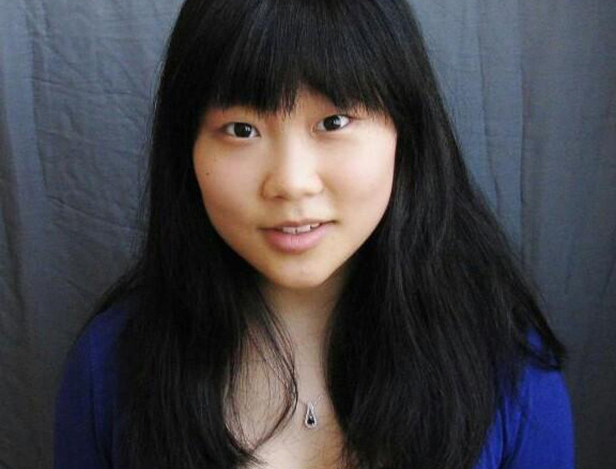耶鲁悼亡27日自杀的20岁中国学生
Yale mourns death of Luchang Wang ’17 by apparent suicideJanuary 28, 2015
 The Yale student community was rocked last night with news that sophomore Luchang Wang, ’17 — mathematics major and member of Yale’s Silliman College — had died Tuesday of an apparent suicide. She was 20 years old. Friends became concerned after Wang posted some worrisome messages to a public Facebook thread on Tuesday, prompting the rapid organization of a campus-wide search by students and friends. The search was coordinated online with friends posting places they had canvassed on Facebook — some ventured as far as East Rock, the park north of New Haven.
Students also contacted Silliman College and Yale Police to officially report Wang missing, launching a door-to-door search. They later reported to police the discovery that Wang had purchased airfare to San Francisco, California; the plane was scheduled to land Tuesday morning. Later that afternoon, police also discovered that the last time Wang had used her Yale ID to swipe into Silliman College was two days prior, and asked students to halt their frantic New Haven search under the presumption that she had boarded her flight and was no longer in the New Haven area. By 6pm Tuesday, Yale College Dean Jonathan Holloway delivered the tragic news to the Yale student community by email that Wang’s body had been recovered in California.
Holloway’s email read in part:
Wang attended high school in Des Moines, Iowa, and in addition to her many academic accomplishments in math and science was an accomplished cross-country runner. She was also moved by the fight for social justice, and was involved in Yale Political Union’s Party of the Left and the Yale Effective Altruists. Friends remember her as an inspiring, witty, and endlessly kind young woman:
Wang is survived by her father, mother and younger sister. I’m heartbroken by Luchang’s loss, not only because the world seems to have lost a powerful young voice this week, but also because I am also part of the Yale community and have spoken on the issue of mental health, depression and suicide as it relates to the AAPI student community several times on this campus in the last year. In each of my workshops, which I strive to construct as a safe space for attendees, students have discussed their personal experiences with depression and mental illnesses, either with regard to themselves and/or with their families. Many have talked about how they feel as if they are literally struggling in silence on this campus when it comes to their depression, and at each of my workshops, students have come forward to discuss the inadequacies Yale’s mental health services. These AAPI Yale students report counselors who are clearly impatient and apathetic, rather than caring and concerned, with a student’s depression. One student recounted how a counselor told her at the end of their 4 sessions to call the office “before 5pm” if the student found themselves contemplating suicide. Students have reported in op-eds that Yale administration has pushed students to leave the school rather than to offer them mental health treatment; similar stories were confirmed to me by students speaking individually after my workshops. When I spoke about the specific need for AAPI students to have access to culturally-sensitive therapists who don’t offer a one-size-fits-all approach to mental health treatment that ignores the specific challenges faced by AAPI students, most of my workshop attendees were shocked — even the idea of personalized mental health care was an anathema on this campus. The Asian American community at Yale is small and tight-knit, and mental health is clearly an energizing issue on this campus: at every workshop I have held on this campus on this topic, I have spoken to a packed room of students, most of whom relish the chance to confront this issue head on. For many, this is the first time they’ve had a frank conversation about Asian American mental health. I am thankful for the times I’ve been able to facilitate these spaces; but I can’t help but ask: where is the Yale administration on this issue? I also can’t help but feel angry, not only at the spectre of depression and mental illness that has claimed yet another young life (of far too many lost), but also at myself. Did Luchang attend one of my workshops? Was she one of the many students who spoke to me during or after my talks? Could I have done more to help her? Could I have worked harder with on-campus Asian American students to organize more mental health workshops? Could I have done more to give Luchang and students like her the resources she needed, and to give them to her long before Tuesday? In the end, I have nothing but sadness at Wang’s death, prayers for her friends and family, and the enduring hope that one day we can finally begin a real dialogue on the topic of on-campus mental health, particularly with regard to the AAPI community, and finally implement the many changes needed to slow the rate at which depression claims the lives of this nation’s young people. The Asian American Cultural Center at Yale issued the following statement by Facebook in regards to Wang’s death:
Yale is offering several services for students: Yale Mental Health and Counseling Services will have professional counselors available at Yale Health until 11pm with an additional counselor on-call at 203-432-0123. If you or someone you know may be depressed or struggling with any other mental health concern, please check out these resources: If you or someone you know is contemplating suicide, please call:
If you believe that you or your friend is in immediate physical danger, call 911 and do not allow the person to remain unaccompanied as long as it is safe to stay. As soon as it appears safe, you can also bring that person to the hospital for additional care. source:http://reappropriate.co/?p=7808 |
已有13条评论
-
-
引用 游客 2015-3-14 15:40
- You should know not just the length of the kid's f ...
-
引用 游客
- The midsole color is important because is usually ...
-
引用 游客
- HEPA filters can trap 99 percent of allergens from ...
-
引用 游客
- Not that I am complaining, butt slow loading insta ...
-
引用 游客
- Quality Dumpster Rental Options Posted on January ...
-
引用 游客
- 19世紀の残りの部分は、海兵隊の使命について、強さと ...
-
引用 游客
- Not long in the pasnike norget theMichael Kors Out ...
-
引用 游客
- lord of the rings blu planet of the apes blu ray b ...
-
引用 游客
- Have a shot at within the cold months jacket which ...
-
引用 游客
- ?, all need to give a certain amount of a tip as t ...
-
引用 游客
- If you haven't heard on the term "SEO", then i ...
-
引用 游客
- Biological chemistry With totally mens new footwea ...
-
引用 游客
- 是20岁,2017届毕业生。不是17岁
-







